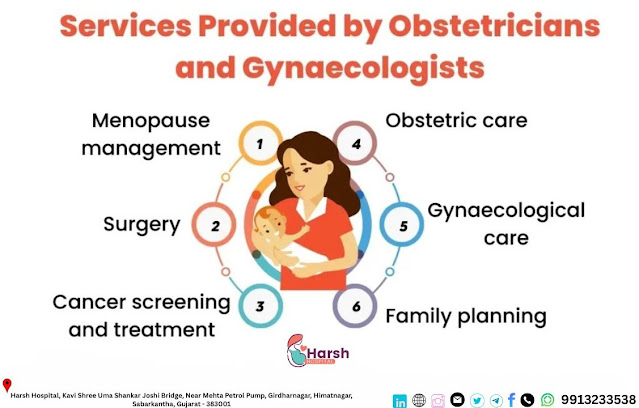 |
| Unlocking the Role of Obstetricians and Gynaecologists – Harsh Hospital, Himatnagar |
Obstetricians and gynaecologists (OB-GYNs) are the cornerstone of women’s health. At Harsh Hospital, Himatnagar, our OB-GYN specialists offer a deep understanding of female reproductive health across all life stages—adolescence, pregnancy, postpartum, menopause, and beyond.
Here’s a closer look at the services our OB-GYN department provides:
🔹 Reproductive & Menstrual Health:
-
Treatment of irregular periods, heavy bleeding, painful cycles (dysmenorrhea), and amenorrhea
-
Diagnosis and management of PCOS, endometriosis, and fibroids
-
Counselling and care for puberty-related concerns
🔹 Fertility & Family Planning:
-
Comprehensive infertility evaluation and treatment
-
IUI, ovulation induction, and advanced fertility management
-
Personalized contraceptive advice (pills, IUCDs, implants, sterilization)
🔹 Pregnancy & Childbirth:
-
Full antenatal care including scans, lab tests, diet advice
-
High-risk pregnancy care (hypertension, gestational diabetes, previous C-sections)
-
Normal delivery, assisted delivery, and C-section options
-
Painless delivery and birth planning
🔹 Gynaecologic Surgeries:
-
Minimally invasive laparoscopic surgery for fibroids, cysts, and uterus removal (TLH)
-
Hysteroscopy procedures for diagnosis and minor surgeries
-
Vaginal surgeries for prolapse or other conditions
🔹 Menopause & Hormonal Care:
-
Menopause symptom relief, HRT (hormone replacement therapy)
-
Management of perimenopause transitions
-
Osteoporosis screening and prevention
🔹 Cancer Screening & Prevention:
-
Pap smear, HPV testing for cervical cancer
-
Breast examination and ultrasound for early detection
-
Uterine and ovarian cancer risk evaluation
At Harsh Hospital, Himatnagar, our compassionate approach, modern technology, and patient-first mindset ensure each woman receives expert and personalized care.
🔖 Hashtags:
#HarshHospital #WomensHealth #Obstetrician #Gynaecologist #MaternalCare #MenstrualHealth #InfertilityTreatment #PCOSAwareness #SafePregnancy #LaparoscopicSurgery #HimatnagarDoctors #FemaleWellness #MenopauseCare #CancerPrevention #FamilyPlanning #OBGYNExperts #ComprehensiveCare #HealthcareWithHeart









